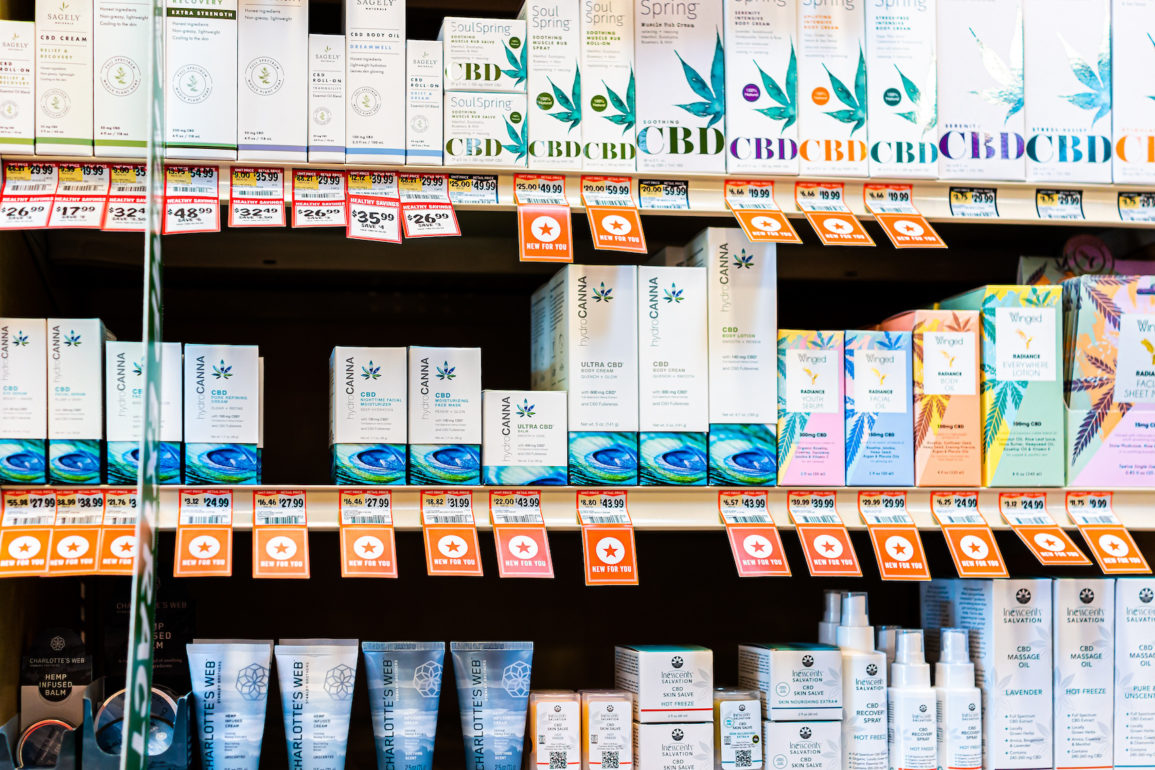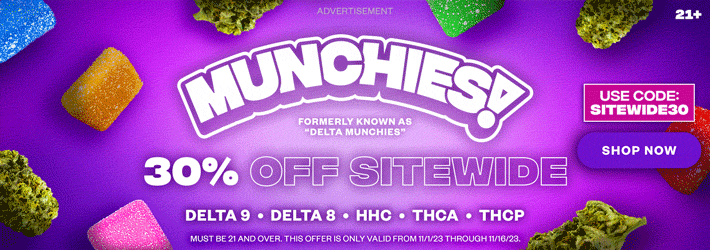Ever since the federal legalization of hemp and hemp-derived CBD in 2018, the CBD industry has experienced its fair share of criticism. The most common concern is the industry’s lack of proper regulatory oversight and how it negatively affects consumer safety. Many even believe near-non-existent regulations means the CBD industry is inherently dangerous and should be avoided.
As advocates of cannabis and proponents of safe and transparent cannabis industry activities, we decided to take this concern and discover whether it’s justified. We took 520 of the biggest CBD companies in the United States and European markets, representing over 20,000 products, and analyzed them to find out whether the lack of regulatory oversight has had a negative effect on the industry.
Is the CBD industry self-regulating? Are companies following proper safety practices?
CBD Companies Analysis
List of All 520 Companies
- Charlotte’s Web
- cbdMD
- Green Roads
- Medterra
- CBDfx
- Lazarus Naturals
- Elixinol
- CBDistillery
- CBD American Shaman
- Lord Jones
- Martha Stewart CBD
- Bloom Farms Wellness
- Foria Wellness
- CBD MEDIC
- Joy Organics
- Nuleaf Naturals
- Extract Labs
- Hemp Depot
- JustCBD
- Social CBD
- Sagely Naturals
- Kush Queen
- Sisters of the Valley
- Papa & Barkley CBD
- Five CBD
- Koi CBD
- Cookies CBD
- Dosist Health
- Dr. Dabber
- Aspen Green
- WYLD CBD
- 3Chi
- Kill Cliff CBD
- Mary’s Nutritionals
- Smokiez CBD
- Care By Design Hemp
- Tommy Chong’s CBD
- TheraOne
- Willie’s Remedy
- VYBES
- Mr Moxey’s CBD
- Dr. Norms
- CBD Living
- Diamond CBD
- Industrial Hemp Farms
- Plant People
- Cheef Botanicals
- FAB CBD
- Neurogan
- Hemp Bombs
- Plain Jane
- BABARI
- Mineral Health
- Apothecanna
- Barlean’s
- Miss Grass
- Bluebird Botanicals
- MoonWlkr
- Populum
- Quatreau
- Zolt
- Greater Goods
- ShiKai
- Wild By Nature
- Beam
- Recess
- Moody’s Medicinals
- Prismatic Plants
- Mother’s Dose
- Premium Jane
- Wink CBD
- Soul Addict
- Wildflower Wellness
- Kat’s Naturals
- Mender CBD
- Grön
- Muri Lelu
- Nordic Oil
- Collective Project
- Endoca
- Essential Candy
- Thera Treats
- Pure Kana
- Blessed CBD (UK)
- Aries Essentials
- Hemplucid
- RE Botanicals
- Sunsoil CBD
- Quill CBD
- Kats Botanicals
- Verma Farms
- Royal CBD
- Pure Relief
- Highland Pharms
- Eir Health
- HempLand USA
- PUR CBD
- Xtend 5
- Mello
- Receptra Naturals
- Highline Wellness
- Hempworx
- CBD Pure
- Sol CBD
- CBD Essence
- Leef
- Healist
- Sunday Scaries
- Veritas Farms
- Smile
- CBD BioCare
- Infinite CBD
- Eco Sciences
- Hemp Meds
- Spruce CBD
- Balance
- Vertly
- Ananda Hemp
- Mission Farms CBD
- Kanibi
- Soul CBD
- CBD For Life
- Rosebud
- Try The CBD
- Hugs
- Buddha Beans Coffee
- biocbd+
- Reakiro CBD
- Hempura
- The Farmacy Bliss
- CBD Life UK
- Feals
- FOCL
- High Falls Hemp NY
- Kiara Naturals
- Not Pot
- Secret Nature
- Toast
- Tweedle Farms
- Vena
- Winged Women’s Wellness
- Pollen
- RVD CBD
- Prima
- Juna
- Love CBD
- Amma Life
- June Atelier
- On Duty CBD
- CBD Skincare Co.
- Hath
- Loot
- Lyte
- Pot d’Huile
- Queen City Hemp
- Reliva
- Ryte
- Potli
- Cannuka
- Cornbread Hemp
- Green Garden Gold
- Ojai Energetics
- Privy Peach
- Sugar & Kush
- SabaiDee CBD
- Sensei Seeds
- Muscle MX
- All Natural Way
- 4 Corners Cannabis
- Life Elements
- Formula Swiss
- Good Day
- Quim
- The Brothers Apothecary
- Infusionz
- Isodiol
- Daytrip
- EMPE
- Onyx + Rose
- Nature’s Script
- Bimble
- Fairwinds
- Organabus
- Gossamer
- Relive Everyday
- Phoria CBD
- Oleo
- Rare Cannabinoid Co.
- Reset Bioscience
- Sheabrand
- Dazey
- Skin Dope
- Supergood
- The Clear
- Tonic
- Upwell
- Veda
- Weller
- Curaleaf Hemp
- Rove Remedies
- Penguin CBD
- PlusCBD
- Ignite
- Hometown Hero CBD
- LuLu’s
- Her Highness NYC
- Crescent Canna
- Mad Tasty
- Flower by Edie Parker
- Hemped NYC
- Lavata
- Eerbshop
- Humbolt Apothecary
- Peach Honey
- Sleep Bear Gummies
- R + R Medicinals
- Friend Leaf
- Beboe Therapies
- Ergo Hemp Co.
- Oley Hemp
- Mendi
- Xula
- Velobar
- Restorative CBD
- Purely Botanical Wellness
- Pally
- Hii Stick
- Vitagenne
- Epic Nutra
- Planetarie
- Nanocraft CBD
- Honey Pot CBD
- Crescent Canna
- HempFusion
- NuuMe
- Vital Leaf
- Im Bue Botanicals
- Pure Science Lab
- Holistic Hemp Scotland
- JuJu Royal
- Dreem Nutrition
- Kickback
- Proposition Cocktail Co.
- Dani Pepper
- Fine Healing Goods
- Auntie Dolores
- Betoken
- TetraLabs
- Mary Joe
- Aurora Elixirs
- Austin and Kat
- Awakened
- Blue Forest Farms
- Blue Ridge Hemp Co.
- Canna Bath Co.
- Champions and Legends
- Chill Body
- Cleen Craft
- Cloud Water Brands
- Disciple
- Dram
- Daydream
- Innovative CBD
- Kannaway
- Trip
- Sprig
- Dwiink
- Empower
- Brain Dings
- Essential
- Buzzn
- Gold Bee
- Hemple
- Holistik Wellness
- Kefla Organics
- Kind Lab
- House of Gro
- Moon Mother
- Mountjoy Sparkling
- Bota
- CV Sciences
- Dr. Whitt’s CBD
- Evolution CBD
- Good Hemp
- Hemptown USA
- Natural Native
- Pet Relief
- Restorative Botanicals
- Ridgway Hemp
- Synchronicity
- Zillis
- Vida Optima
- Original Hemp
- oHHo
- K’dara
- Flora Sophia Botanicals
- Green Unicorn Farms
- Lunchbox Alchemy CBD
- Botany Farms
- Delta 8 (D8)
- BATCH
- Delta Extrax
- Envy CBD
- Naternal
- Also Organics
- GoGreen Hemp
- Zebra CBD
- Hempure
- Skyhio
- VIIA
- Treetop Hemp
- CannaAid
- Lifted Made
- Kalibloom
- Mellow Fellow
- CBD Farm House
- Tillman’s Tranquils
- Blue Moon Hemp
- Nu-X
- Alive & Kicking
- Half Day
- NUVITA
- Procanna
- bioMD+
- Steve’s Goods
- Myriam’s Hope Hemp
- Vesl
- Holistic Hound
- Lily Hill
- Restart CBD
- Wild Theory
- King Buddha CBD
- Honest Paws
- Miraflora
- HolistaPet
- The Anxious Pet
- ABSC Organics
- King Kanine
- Innovet
- Petly CBD
- Penelope’s Bloom
- UNOIA
- Relievet
- ZenPup
- Dope Dog
- Chill Paws
- ElleVet
- MediPets
- Colorado Botanicals
- Leaf Remedys
- EVN
- Pet Hemp Company
- Treatibles
- Doggie Beer Bones
- The H. Hemp Company
- Pure Spectrum
- 2Rise
- Green Lotus Hemp
- Hempzilla
- Savage CBD
- Redwood Reserves
- Rouge Origin
- Calm By Wellness
- Difiori
- Daughter of the Land
- Equilibria
- Vital You
- Strava
- Allo
- Jane West
- Ott Coffee
- Sunriser
- Funky Farms
- Tribe Tokes
- Avida
- Healthworx CBD
- Baskin
- Fabuleaf
- Bace
- Pure Ratios
- Millie
- Crystal Creeks Organics
- Creating Better Days
- Proleve
- Blosum
- Green Gorilla
- Tanasi
- Stello
- Innovative Extracts
- Jupiter
- Zatural
- Caliper
- Absolute Nature CBD
- Bloom
- Mana Artisan Botanics
- SHEbd
- CBD Pillow
- CBDent
- The Hemp Doctor
- Paw CBD
- Purelix Wellness
- Palm Organics
- Upstate Elevator Supply Co.
- Just Live
- ReThink
- Pachamama
- Leafwell Botanicals
- Mint Wellness
- CBD Dog Health
- Asha Apothecary
- Naturecan
- Redeem Therapeutics
- Eden Herbals
- Osiris Organics
- Sunmed
- MaxCBD Wellness
- Smilyn
- WelCel
- Big Sky Botanicals
- CalyFX
- Plant Power
- Drop
- Nirvana
- Pure Hemp Botanicals
- Coastal Clouds CBD
- Irwin Naturals
- One Farm
- Tree of Life Seed
- Uncanna
- Elevate Hemp
- Able CBD
- Dinner Lady
- Blesswell
- Happy Place
- American Green
- Harvey’s
- Mynd
- Seabedee
- Erth Hemp
- Vida+
- Serene Cannabis
- Pacific CBD Co.
- Cibdol
- Provocan
- CaniBrands
- Stigma
- Avid Hemp
- Transcend Labs
- Kushly
- Kore Organics
- Alpinos
- Cannabidiol Life
- Zadaka
- Deep Relief
- Game Up Nutrition
- Oki
- Fourfive
- Mystic Labs
- Dr. Zogg’s
- Welly Jelly
- Cannadips
- Pure Craft
- Kitsie
- Camberwell
- Essence Smokes
- Imaginal Biotech
- Lix
- New Phase Blends
- Level Select CBD
- Citrus CBD
- Forth CBD
- Lovewell Farms
- Press Pause Project
- The tabEASE Company
- B Great
- CBD Lion
- Cannaflower
- Green Times Brewing
- SurityPro
- This Works
- BioSteel
- First & Free
- Binoid
- Organic CBD Nugs
- Oklahoma Smokes
- Acabada
- Leafwell Botanicals
- Aire
- Strainz
- Wisdom Essentials
- Oncali
- Harmony
- EthicaCBD
- Happy Dance
- Hollyweed
- Burt’s Bees
- E1011 Labs
- Motive
- PEACE+
- The Alchemist’s Kitchen
- Dad Grass
- OMURA
- 43 CBD
- Tranquil Earth
- TerraVita
- Golden Goat
- GleeCBD
- Earlybird
- Prospect Farms
- Defy
- OFFFIELD
- Jibby Coffee
- Curfew
- Flor
- Liweli
- COEUR
- Sweet Sensi
- Dr. Kerklaan Therapeutics
- Sensitiva
- Canna-Pet
Key insights
Ever wondered which U.S. state is the most popular location for hemp? Want to know the most common hemp CBD extraction method? Are brands ensuring safety and transparency at every level? How popular are minor cannabinoids such as CBG, CBC, and delta-8? Are CBD companies self-regulating in an unregulated industry? Our analysis of 520 of the biggest CBD companies, representing over 20,000 products, answers these questions and more.
Summary of key insights:
- Third-Party Testing: 90% of companies test their CBD products through an accredited third-party lab, showing a transparent industry, despite lack of scrutiny
- Hemp Source: Colorado is the most common location for sourcing hemp; surprisingly, only 5% of companies source their hemp from California
- 89% of companies fully disclose their hemp source and cultivation practices
- 8% of companies import their hemp from international hemp farms
- Product Categories: CBD oil is the most common type of product with 72% of companies carrying oils, followed by CBD topicals, capsules, and gummies
- Extraction Methods: 42% of companies utilize CO2 as their primary extraction method
- 43% of companies fail to provide information on which extraction method is used for their products
- Pet CBD: 30% of companies sell CBD products for pets including dogs, cats, and horses
- Minor Cannabinoids: CBG is the most common minor cannabinoid with 20% of companies offering it, followed by CBN and CBC products
- 10% of companies sell delta-8 THC products
- 1% of companies offer delta-10 and THC-O products
- Potency: The highest potency product available on the market is a 20,000mg CBD oil; 3% of companies offer CBD potencies above 10,000mg
- Pricing: The most common price range is $0.06-$0.10 per mg of CBD
- Certifications: 5% of companies are USDA Certified Organic
- Celebrities: 3% of companies are owned by a celebrity
1. Top U.S. states for hemp source
Hemp source refers to which location a CBD company sources its hemp plants and how they’re grown and under what conditions.
Roughly 30% (153) of CBD companies sourced their hemp from farms located in Colorado, 13% (68) sourced it from Oregon, and 5% (25) sourced it from Kentucky. None of these states hitting the top 3 is particularly shocking. Colorado and Kentucky legalized hemp farming in 2014, establishing successful, long-standing hemp pilot programs. Oregon joined them a year later in 2015.
Surprisingly, only 5% (25) sourced their hemp from California, a state with over 550 registered growers operating in near-perfect hemp growing and cultivation conditions.
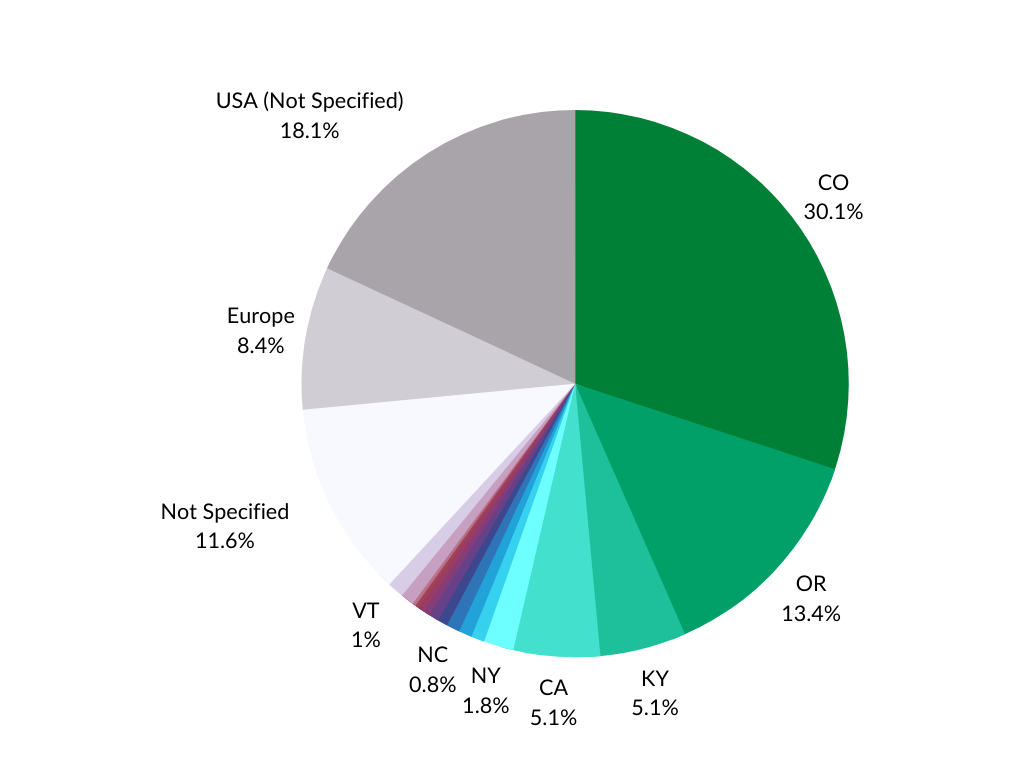
The most common hemp source locations chosen by CBD companies include:
- Colorado = 153 (30%)
- Oregon = 68 (13%)
- Kentucky = 25 (5%)
- California = 25 (5%)
- New York = 9
- Vermont = 5
- Montana = 4
- Wisconsin = 4
- North Carolina = 4
- Tennessee = 4
- Florida = 3
- South Carolina = 3
- Pennsylvania = 2
- Minnesota = 2
- Hawaii = 1
- Arizona = 1
Why does the hemp source matter and how does it affect your CBD product’s quality?
Hemp source matters because it indicates the safety and quality of your CBD products. Domestically grown U.S. hemp is the optimal choice. Why? All legal U.S. hemp farms operate under strict federal and state regulations which oversee hemp cultivation and production. These regulations are governed by the USDA in line with the 2018 Farm Bill and designed to uphold safety and quality standards across the entire hemp farming industry, resulting in pure, clean, and uncontaminated CBD products.
However, not every country has the same regulatory oversight regarding safe, quality hemp production. A lack of stringent regulations means internationally imported hemp might carry harmful contaminants and more THC than legally permitted. In other words, the hemp used in your CBD products could do more harm than good.
Are some U.S. states better hemp source locations than others?
Yes, despite comprehensive federal regulations governing hemp, some U.S. states are better than others regarding hemp cultivation and production.
Colorado and Oregon, for example, have established long-standing hemp programs since 2014 and 2015, respectively. This means Coloradan and Oregonian hemp farms have adhered to strict regulations and perfected their cultivation practices for 6-7 years, which is why both U.S. states are considered two of the most popular hemp source locations.
However, the state a CBD company’s hemp is grown isn’t the only thing you should take into account. Certifications from legitimate regulatory agencies (federal or independent) are also incredibly important. Certifications prove hemp farmers follow strict guidelines ensuring safety and quality throughout their entire cultivation, production, and manufacturing process.
Why should CBD companies know and disclose the source of their hemp?
CBD companies should know and disclose the source of their hemp for safety, quality control, and transparency reasons. Many companies source their hemp from white-label suppliers with very little control over its quality. Knowing the origin of the hemp ensures quality control and improves transparency between the company and consumers. This promotes trust, transparency, and openness.
Percentage of CBD companies not disclosing their hemp source:
Thankfully, only 11% (57) of CBD companies fail to disclose their hemp source. 19% (11) of these 57 CBD companies primarily sell CBD drinks and beverages, which indicates a lack of transparency in this market. Interestingly, almost all of these CBD drinks and beverage companies also fail to disclose their extraction methods and third-party testing results.
2. Percentage of companies using imported hemp
Only 8% (39) of the CBD companies we analyzed import their hemp from international hemp farms, with Europe being the preferred choice.
The most popular European locations are Holland (5), Lithuania (4), Switzerland (4) and Spain (4), followed by Scandinavia (3). Surprisingly, Italy and France aren’t chosen as hemp sources despite being touted as two of the best European locations to grow and cultivate hemp for industrial and commercial purposes. The remaining 7 companies source their hemp from European hemp farms without providing an exact location. Do they get their hemp from white-label companies with less control over the quality? We’re not sure, but it’s easy to assume that’s the case.
3. Percentage of companies third-party testing their products
Nearly 90% (465) of all CBD companies third-party test their products and post the Certificates of Analysis on their websites. This is really impressive and not only showcases an industry willing to take the appropriate safety measures for its customers but also upholds the right standards.
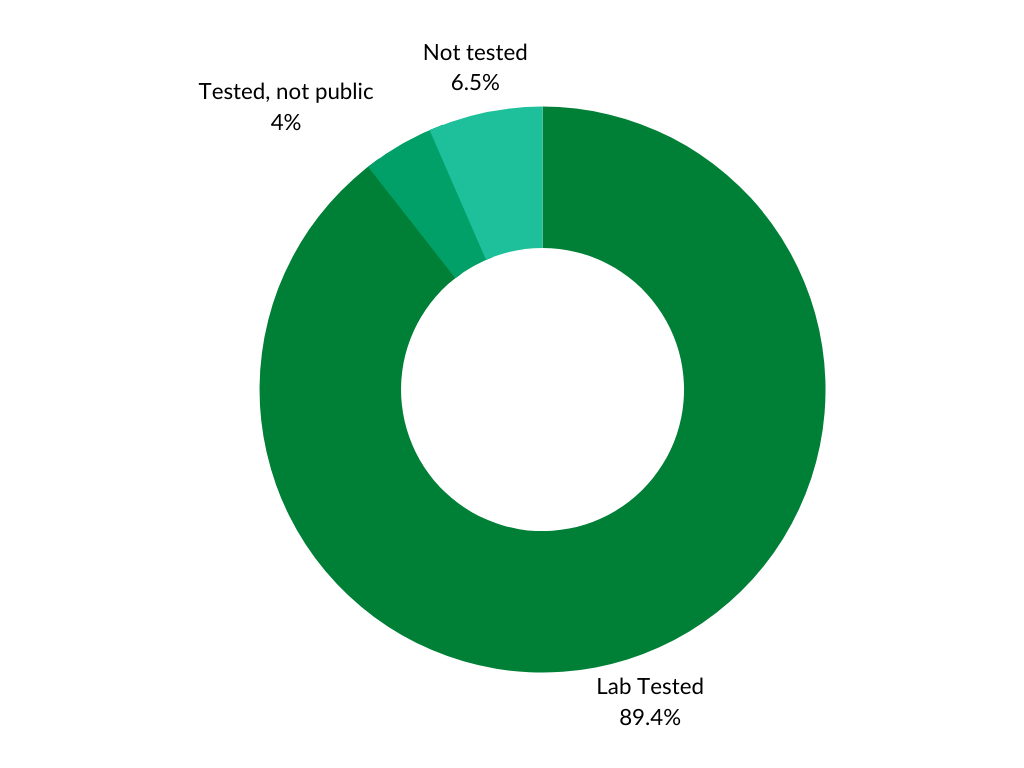
What is third-party testing exactly?
Third-party testing refers to the testing of CBD products performed by accredited, independent laboratories specializing in cannabis analysis. Laboratories commonly test for cannabinoids and terpenes in the hemp extract, as well as the presence of any contaminants such as heavy metals, residual solvents, and mycotoxins. Once testing is complete, Certificates of Analysis (COAs) are issued verifying the results. All legit companies post COAs publicly as proof of testing and for your reference.
Why is third-party testing important for the CBD industry?
Despite progress in the CBD industry, it remains largely unregulated, resulting in shady companies producing bogus products filled with harmful contaminants.
Third-party testing acts as a microscope into the products you purchase and lets you know what’s in them, eliminating concerns over their safety. The credibility of the lab carrying out the product testing is also essential and what separates a semi-safe product from one that’s almost-guaranteed fit for consumption.
There’s a risk of impurities being present in products that companies won’t know about unless they run a full panel test that checks for pesticides, residual solvents, heavy metals, and other impurities.
Eric Tam, Senior Chemist at Anresco Labs
“At a minimum, labs should follow guidelines by the Bureau of Cannabis Control (BCC) to ensure the testing method is reliable and consistent across the industry. The certification of the laboratory is also important. In California, the minimum requirement is to be ISO certified. We also participate in other performance test studies to ensure our services are passing performance test samples (blind samples), to see how close we are to meeting the industry standards,” he continues.
What do you do if a CBD company has no COAs?
If a CBD company has no publicly available lab reports posted on its website, don’t immediately think it’s a scam company selling shady products. While it’s good practice to post them on the website, it’s not mandatory. We recommend emailing a member of the company’s customer service team and request them. All legitimate companies are happy to oblige. If the customer service team fails to reply with the COAs, move onto another company.
4. The most common CBD products on offer
The most common CBD product offered is CBD oil. Nearly 72% (372) of companies sell some type of CBD oil. This isn’t surprising. The CBD oil market generated $962.7 million in 2020 and is predicted to grow to $5.3 billion by 2025.
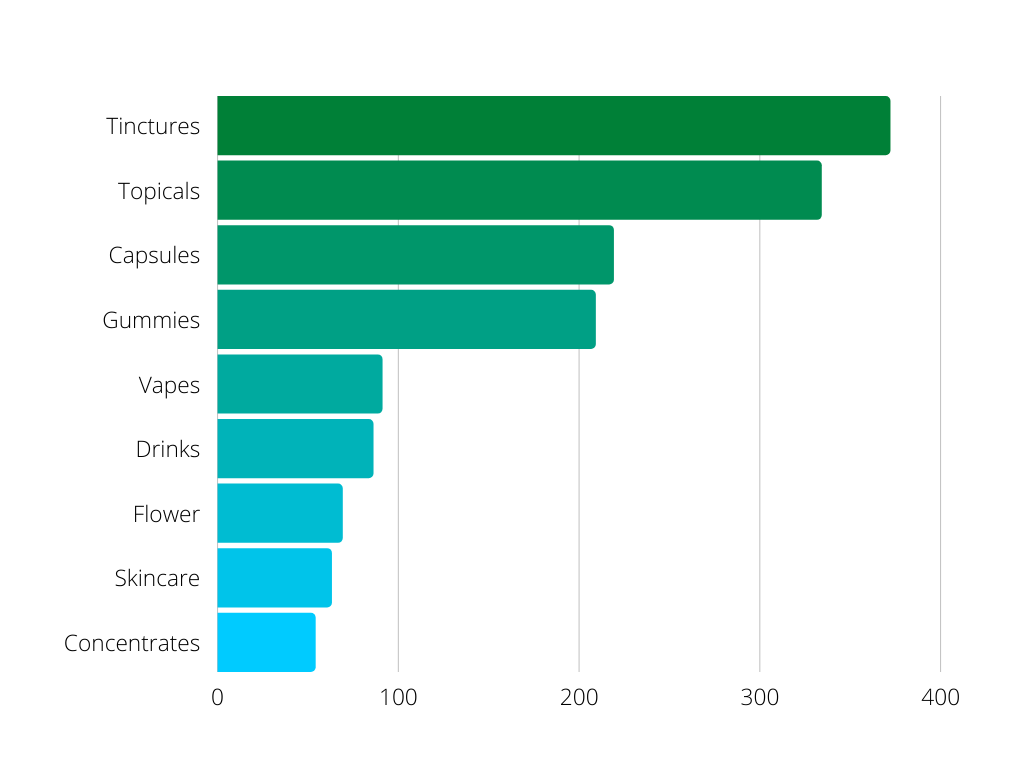
The second-most popular CBD product offered is CBD topicals followed by CBD capsules. Just under 65% (334) of the companies we looked at sell some type of CBD topical product, while 43% (224) sell CBD capsules. Again, this isn’t a shock. CBD topical sales exceeded $703 million in 2019 and are predicted to hit $4.5 billion by 2025 (second to CBD oils).
The most common CBD topical products are specialized CBD face creams, CBD sport sticks, and CBD bath bombs, most of which carry additional ingredients marketed for pain relief. The most common type of CBD capsule is soft gels carrying anywhere between 15-25 mg of CBD per soft gel.
The most common CBD product categories include:
- Oils and tinctures = 372 (72%)
- Topicals = 334 (65%)
- Capsules = 219 (42%)
- Gummies = 209 (40%)
- Vape pens and juice = 91
- Drinks and beverages = 86
- Flower and prerolls = 69
- Beauty and skincare = 63
- Concentrates = 54
- Vaporizers = 30
- Chocolates = 30
- Candy = 14
- Transdermal = 14
- Supplements = 13
- Suppositories = 8
- Intimate = 7
- Inhalers = 3
- Candles = 2
Related: List of Every CBD Product Type Available
5. The most common hemp extraction method
By far, the most common hemp extraction method is carbon dioxide (CO2) extraction. A whopping 42% (217) of CBD companies utilize CO2 as their primary extraction method, promising consistently clean and safe CBD hemp extracts. Ethanol came in second with 11% (56) of CBD companies using it to create CBD hemp extracts.
Why is CO2 the most popular extraction method?
CO2 extraction is known as the safest, cleanest, and most versatile method of extracting valuable plant compounds from hemp plants. CBD companies and producers using CO2 enjoy higher yields, reduced extraction times, and lower energy output, and lower overall costs, resulting in an efficient, environmentally friendly extraction process.
Percentage of companies that don’t provide extraction method information
The extraction method refers to the way a CBD company or producer extracts all the valuable plant compounds from hemp plants.
Unfortunately, 43% (221) of CBD companies fail to provide information on which extraction method is used for their products. This figure is concerning.
Complete transparency is hypercritical in the CBD industry. There is no federal regulation in the space, which allows a lot of bad actors in the CBD market to thrive. These brands mislead customers on the quality of their product and/or they make inappropriate claims about curing diseases. This makes the CBD business extremely challenging for the reputable companies in the space, and we constantly have to communicate our commitment to transparency and product integrity in everything we do.
Melissa Davis, Head of Education at Elixinol
6. Percentage of CBD companies offering pet CBD
According to Brightfield Group, consumers in the CBD market spent just shy of $426 million on pet products in 2020 and predict sales to reach $629 million by the end of 2021.
Therefore, it’s not a big shock to discover over 30% of CBD companies sell CBD products for pets, many of which are specifically targeted at dogs, cats, and horses. Some common CBD pet products include oils, capsules, edible treats, and topicals.
7. Percentage of CBD companies offering delta-8 THC products
Delta-8 THC is the newest phenomenon in the cannabis industry, often touted as the next big cannabinoid since delta-9. According to New Frontier Data, delta-8 sales reached upwards of $10 million across the US in 2020. The reason for this jump in sales? It’s federally legal and many states still allow the purchase, use, possession, sale, and distribution of delta-8 products.
However, despite growing interest in delta-8 THC, only 10% (69) of companies sell delta-8 THC products including delta-8 distillates, delta-8 carts, delta-8 gummies, and delta-8 flower.
Considering delta-8’s exponential market growth in the U.S., this is somewhat surprising. However, the rise in delta-8 restrictions across 19 U.S. states is most likely contributing to this low number. Many online and in-store delta-8 vendors operating in newly restricted states ceased selling delta-8 products in 2021.
What’s the percentage of CBD companies selling delta-10 THC?
Like delta-8, the market for delta-10 THC products is widening as their popularity begins to increase. Currently, only 1% of CBD companies sell delta-10 THC products.
What’s the percentage of CBD companies selling THC-O products?
Similar to delta-8 and delta-10, THC-O is an up and coming THC variant with a lot of potential in the cannabis market. However, since it’s a relatively new cannabinoid, only 4 (1%) of companies sell THC-O products.
8. Minor cannabinoids making their presence known
The hemp-derived products market isn’t just about CBD anymore. Several minor cannabinoids are enjoying the spotlight.
Just under 20% (100) sell cannabigerol (CBG) products including CBG flower, CBG distillates, and CBG oils (usually paired with CBD). Likewise, just over 12% (63) of companies sell CBN products and 4% (10) sell cannabichromene (CBC) products.
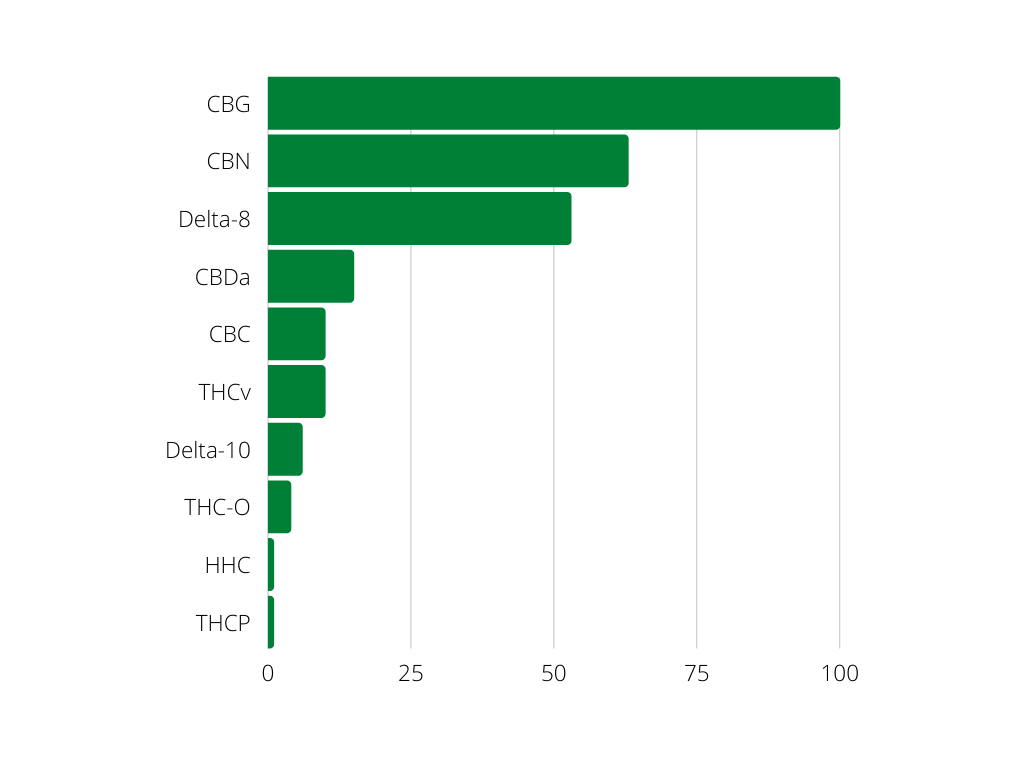
The proliferation of minor cannabinoid products isn’t shocking. Research suggests CBG could be a stronger pain-reliever than THC and a more effective neuroprotectant than CBD. Similarly, CBC could potentially reduce arthritic pain and inflammation.
CBN’s benefits, on the other hand, aren’t as well known. Many believe it possesses potent sedative qualities similar to THC but the research is old and somewhat limited. Anecdotally, CBN users claim it’s the most effective cannabinoid out there. Some are even replacing conventional benzodiazepines with daily CBN doses.
9. Maximum potency available
The highest CBD product potency we found is a 20,000 mg CBD isolate tincture from CBD Lion that costs $714.99. Each drop of oil carries approximately 33.3 mg of CBD (166.7 mg per serving). No other company offers this potency.
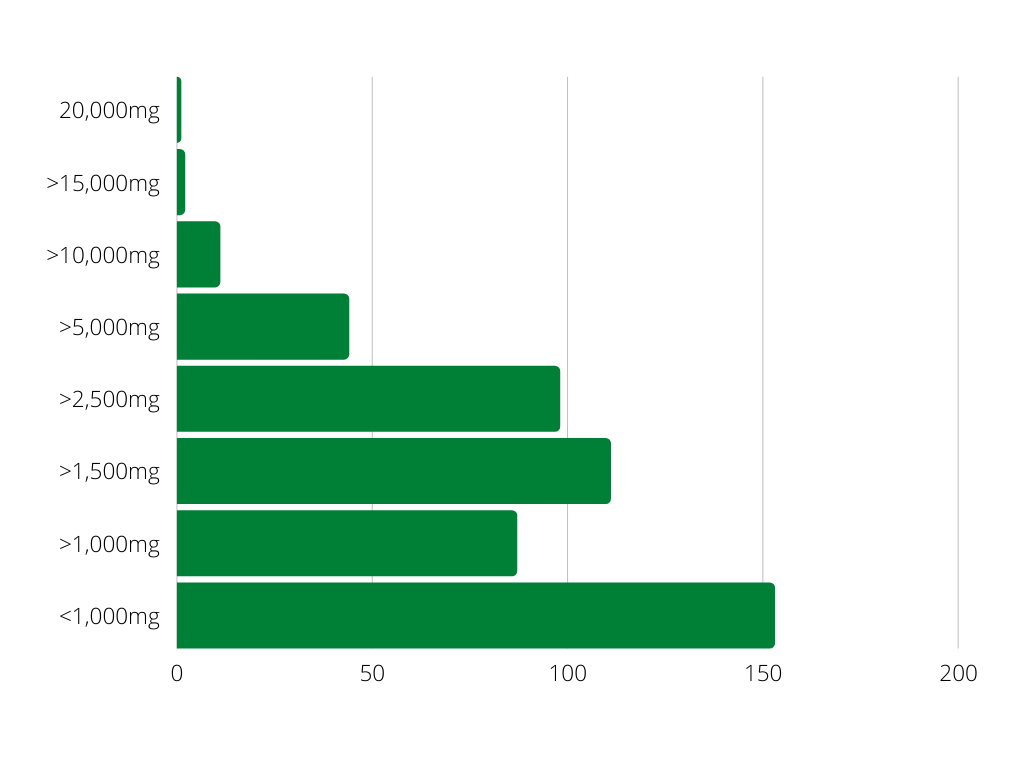
The second highest CBD product potency is CBD Harmony’s 18,920 mg full-spectrum CBD oil that costs $1,000. Overall, only 3% (14) of companies offer CBD potencies above 10,000mg per product. On average, the maximum CBD potency level offered by companies is about 2,100mg per product.
10. The price of CBD isn’t as high as you think
The price of CBD products is generally not as expensive as you think.
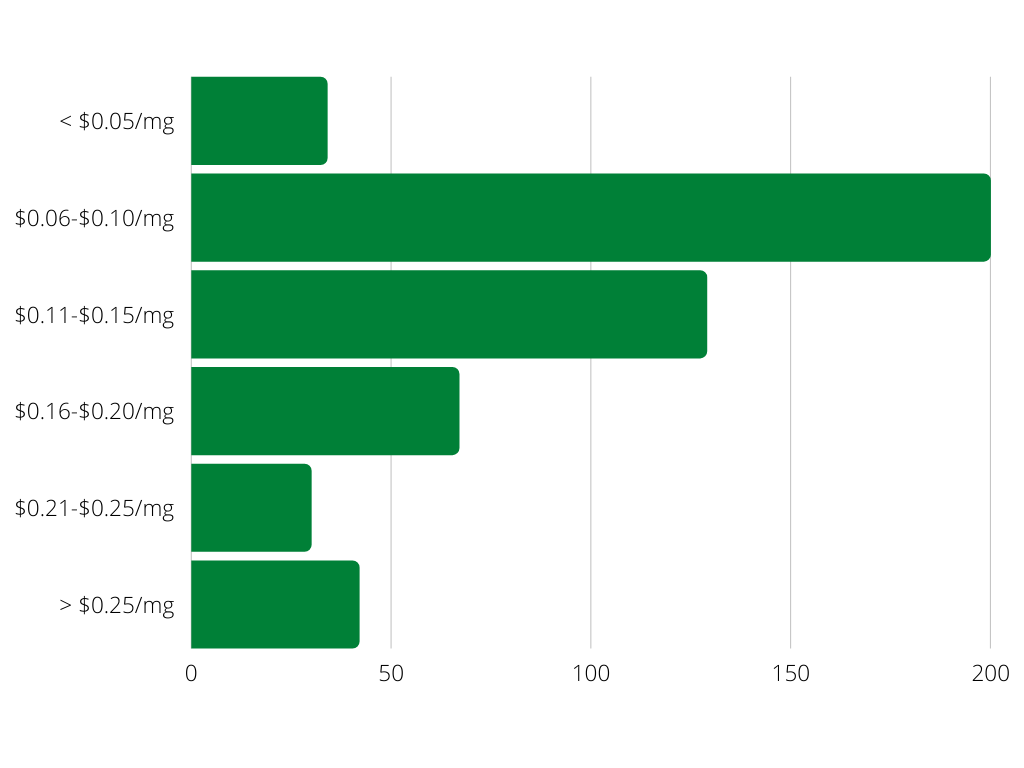
Over 70% (381) of CBD companies don’t price their products any higher than $0.15 per mg of CBD. Only 13% (67) price their products between $0.16-$0.20 per mg of CBD and a mere 6% (30) price their products at $0.21-$0.25 per mg of CBD.
The most common price range is $0.06-$0.10 per mg of CBD (38% of CBD companies). On the lowest end of the scale, 7% (34) of CBD companies price their products below $0.05 per mg of CBD.
11. Percentage of CBD companies that are certified USDA Organic
The USDA Organic certification is one of the most well-respected and highly sought-after labels any CBD company can obtain. It verifies that a CBD company is adhering to strict guidelines set out by the USDA National Organic Program.
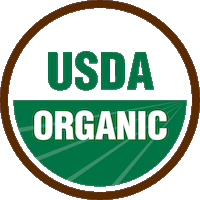
To be given the USDA Organic stamp of approval, CBD companies must demonstrate the protection of natural resources, use of approved substances, and conservation of biodiversity.
Since the USDA Organic certification is very difficult to obtain, especially in the CBD and cannabis industries, only 5% (25) of the CBD companies we analyzed are certified USDA Organic.
Some of the CBD companies that offer USDA certified organic product(s) include:
- Charlotte’s Web
- Joy Organics
- Lazarus Naturals
- Aspen Green
- TheraOne
- Toast
- Cornbread Hemp
- NuLeaf Naturals
- R+R Medicinals
- Humplucid
- Sunsoil
- RE Botanicals
- Ojai Energetics
- Cloud Water
- NuuMe
- HempFusion
- 43 CBD
- Harvey’s
Insights from a certified USDA Organic CBD company
We reached out to R+R Medicinals, a CBD company with a long-standing USDA Organic certification, and asked its founder and head honcho why being certified USDA Organic is essential in the CBD industry.
We’ve been using USDA Certified Organic hemp since 2019. We’re proud that nine of our products now bear the USDA Organic logo, and are actively working on certifying the rest of our line wherever possible.
Dave Baugh, Founder and CEO of R+R Medicinals
“Our number one driver for accountability is our customers. They are our top priority. Every decision we make as a company revolves around their sentiments, feedback, input, and needs. As a totally bootstrapped and employee-owned company, this ‘true north’ of our customers is a unique alignment for our brand compared to others, as we do not serve a board of venture capitalists or public shareholders. Our mantra of ‘treat our customers like our own mothers’ is true and bleeds through to every aspect of our company,” he finishes.
A company claiming it’s organic isn’t the same as being USDA certified organic
While some CBD companies claim to be “100% organic” in their website and marketing literature, this doesn’t mean they’ve been given the USDA certified organic stamp of approval. It simply means they’ve sourced their hemp or additional ingredients from farms or producers adhering to organic practices.
For you to recognize a USDA-certified organic CBD company, we recommend looking for the official USDA Organic seal. Most companies will use this seal on their website and products.
If a CBD company claims to be USDA certified organic without displaying this seal, it’s probably not certified organic.
12. Celebrity CBD isn’t always the most transparent CBD
Celebrity-owned CBD companies aren’t always the most transparent. Mike Tyson’s Dwiink and Ivan Moody’s Moody’s Medicinals are shining examples of this. Both companies fail to provide information on their hemp sources and extraction methods. Worse, there are no publicly available third-party test results, which is the ultimate cardinal sin within the CBD industry.
Other examples of poor transparency among celebrity CBD brands include RVD CBD and Tommy Chong’s CBD. Neither company provides an exact hemp source or extraction method.
Self-regulation in an unregulated industry
It’s no secret the CBD industry is largely unregulated. A federally governed regulatory network doesn’t exist. This had led to an increase in shady companies selling poor, contaminated, and unsafe products to unsuspecting customers.
As a result, consumers, CBD companies, and independent hemp authorities are forced to regulate the industry through education, testing, certifications, correct labeling, open communication, accountability, and responsible hemp source choices, The US Hemp Authority, for example, offers a comprehensive certification program designed to legitimize the industry, add credibility to CBD companies, and ensure strict standards are being met.
Closing thoughts: The CBD industry is doing well despite lack of regulatory oversight
Despite a lack of regulatory oversight, the CBD industry is doing better than we expected. Many of the CBD companies we examined are transparent with their hemp source, third-party testing, extraction method, three things that are important for consumers to know.
Minor cannabinoids such as CBG, CBN, and delta-8 are taking center stage too, indicating an industry thriving on innovation and fresh ideas. We expect more CBD brands will produce minor cannabinoid-based products in the future.
It’s also great to see more CBD companies receiving the USDA Organic certification. Not only does this show a willingness to uphold the very best safety standards and comply with federal guidelines but it also legitimizes the industry as a whole. As more companies become USDA Organic, a standard will be set for others to follow.
Methodology
How we gathered the list of CBD companies
We gathered our list through various different sources to get a well-rounded pool of U.S. and European CBD companies. Sources included market research, our own independent research, and social media.
We started with databases from legitimate hemp and CBD organizations such as US Hemp Authority, National Cannabis Industry Association (NCIA), and Hemp Industries Association (HIA). These databases show CBD companies certified by each organization, indicating legitimacy, credibility, and an adherence to strict safety and quality standards. We then used our own Oracle review database, companies that have contacted us via email, and search engines.
How many individual products do these companies represent?
The number of individual CBD products these companies represent is approximately 20,000.
How were the average prices calculated?
We took the top three selling CBD product categories (oils, capsules, gummies), picked one product from each, and averaged out the price per milligram (mg). If a company didn’t sell oils, capsules, or gummies, we averaged out the price based on the products they had e.g. beverages or concentrates.
USDA Organic
USDA Organic certificates are given to specific CBD products rather than an entire CBD company. A CBD company displaying USDA Organic seals on its website also doesn’t indicate all products are certified organic. Companies such as Lazarus Naturals, Charlotte’s Web, and Aspen Green all display the USDA Organic logo properly by associating it to specific certified products.
